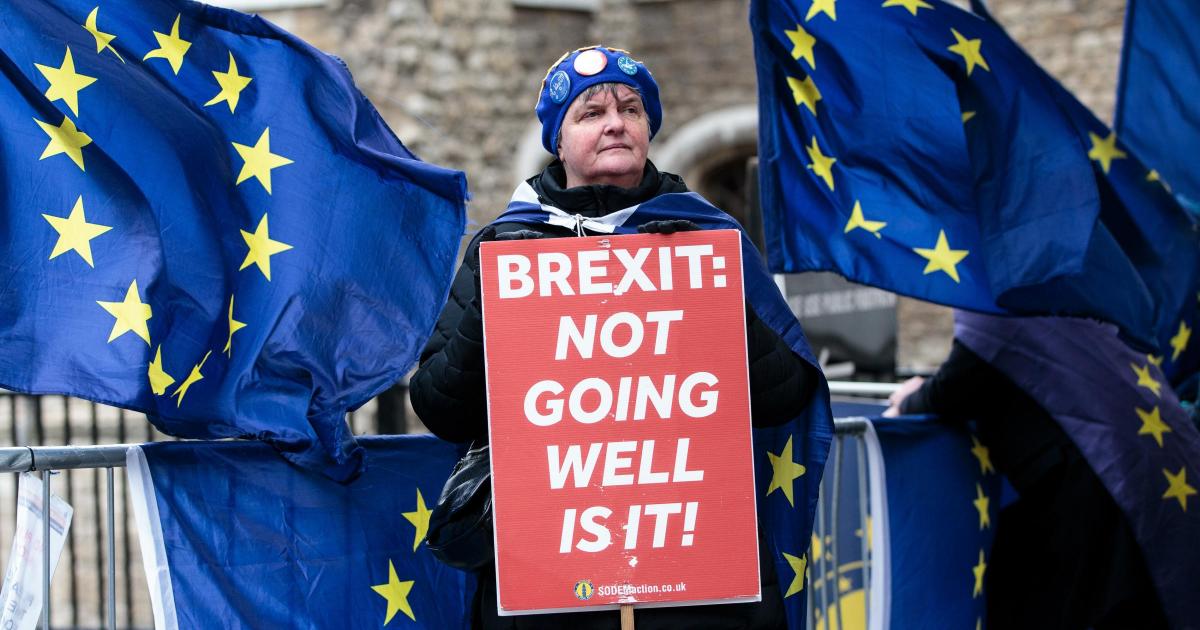Sadly, however, the Brexit nightmare (we might as well be specific about the type of dream) is very far from over.
And most of the self-harm inflicted by Brexiters on the UK will remain very much in place even if all of what is planned in the agreement between the Labour Government and the EU transpires.
That is not to say there are not very welcome things in the agreement. It is just to highlight the very small scale of the mitigation of the Brexit damage that Labour has decided to pursue and on which it has reached agreement.
Details have still to be worked out on the youth mobility scheme and the plans to reduce some of the friction on trade between the UK and its largest trading partner arising from Brexit.
However, the UK Government has put a figure on the expected economic benefit from the agreement.
It estimates the measures agreed with the EU will boost annual UK gross domestic product by around £9 billion by 2040. This is a fillip of around 0.3%.
The independent Office for Budget Responsibility has calculated the cost of Brexit at around 4%.
That is the key comparison to put what the Labour Government has agreed in perspective.
OBR chairman Richard Hughes said in spring 2023 of Brexit’s effect: “We think that in the long run it reduces our overall output by around 4% compared with had we remained in the EU.”
It is interesting to note, however, that the effect of the very small steps Labour has taken to mitigate a tiny portion of the colossal Brexit damage is much greater than the benefit projected from the UK’s India trade deal announced earlier this month.
Much was made of this Indian deal when it was unveiled, by the Labour Government and many others including those Brexiters who give the impression they long for the bygone days of the British Empire.
The UK Government estimates annual GDP will by 2040 be 0.1% higher than it would have been without the India trade deal.
While it is interesting this is less than the projected benefits from the EU agreement, it is not really that surprising.
After all, countries obviously trade more with others close to them.
And it is dispiriting Labour has chosen to seek to mitigate only a small part of the huge Brexit damage.
Labour is sticking with the key aspects of the Conservatives’ hard Brexit – the ending of frictionless trade and loss of free movement of people between the UK and countries in the European Economic Area.
That is not to say what it has agreed with the EU is not a modest positive to anyone interested in mitigating the Brexit damage.
Seemingly, that group does not include the Conservatives.
As they anticipated the agreement with the EU being announced, the Conservatives declared on May 12: “Conservatives say no to Starmer’s Brexit surrender.”
They added: “Under Kemi Badenoch’s leadership, the Conservative Party, including the entire shadow cabinet, have committed to reversing any ‘reset’ that gives up our hard-won freedoms.”
Read more
The Conservatives characterised Prime Minister Sir Keir Starmer’s “so-called reset” as “an attempt to distract the public from his chaotic economic plans and the damage this Labour Government is doing to Britain”.
This is pretty rich, coming from the party which delivered the UK’s hard Brexit.
The main criticism that could be aimed at the Labour Government, of course, is that it should not be pottering about in the foothills and should actually just launch a concerted drive to get the UK back into the European single market as soon as possible.
What is needed is the reinstatement of frictionless trade and return of free movement of people between the UK and EEA.
In the meantime, what Labour is doing is certainly not a “betrayal”. The plans agreed with the EU are woefully small but they will benefit, rather than harm, the country.
They cover some important areas. The drive to make trading in “agri-food” less difficult will be most welcome to companies in this sector which have been tied in knots by the post-Brexit bureaucracy inflicted on the UK by former Conservative prime minister Boris Johnson’s Brexit deal.
People travelling from the UK to other European countries will be relieved at being able to avoid long queues by having the opportunity to make greater use of electronic passport gates. Those with dogs and cats will benefit from the “pet passports”. And the moves around mutual recognition of professional qualifications, while the overall impact is small, will make a big difference to people in the affected sectors.
The greatest positives, however, are surely around the clawing back of some opportunities for young people to work, study, live and travel abroad that were taken away by Brexit.
Broad agreement around a youth mobility scheme between the UK and EU represents major progress. It will not offer young people what they had before the Brexit folly but it is an important step forward, as is exploration of the UK rejoining the Erasmus+ scheme which offers such valuable opportunities to study abroad.
Labour needs to go much further, for the good of the country, to mitigate the enormous damage from Brexit. However, at least it has made a start and last week’s agreement was certainly, as far as it went, good news.
